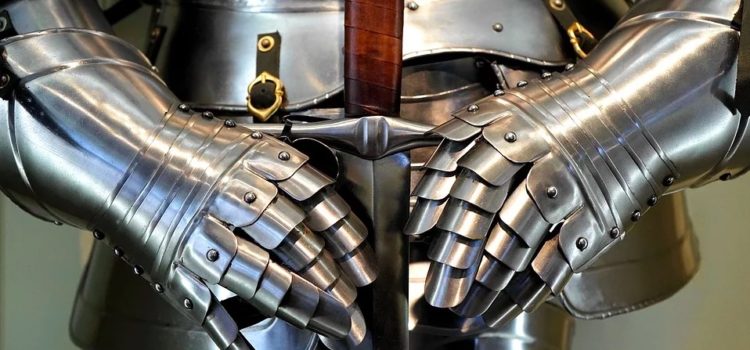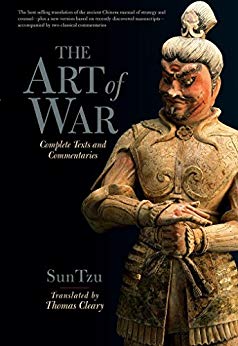

This article is an excerpt from the Shortform summary of "The Art of War" by Sun Tzu. Shortform has the world's best summaries of books you should be reading.
Like this article? Sign up for a free trial here .
What are some of the most famous Sun Tzu Art of War quotes? What do they mean?
The Art of War by Sun Tzu is a renowned guide for how to engage in conflict and be successful in battle. Written more than two thousand years ago, Sun Tzu, a Chinese warrior and philosopher, details the nature of competition and psychology of leadership and provides strategies for how to approach both. Although his teachings are geared toward actual military conflict, the principles can be useful in all arenas of conflict or competition, even at a personal level.
We’ll cover some of the most valuable of the Sun Tzu Art of War quotes and what Tzu meant by them.
Quote #1: Appear weak when you are strong, and strong when you are weak.
This is one of the most famous Sun Tzu Art of War quotes. What does it mean?
The goal of any conflict is to control your opponent and overcome them. Controlling their beliefs about your abilities helps you understand their assumptions and plan a strategy accordingly. As a well-known translation of Sun Tzu puts it, “all warfare is based on deception.”
Deception includes feigning weakness when you are strong or professing ignorance when you are informed. Appearing to be weak, unprepared, or small in size can lure your opponent into traps and make them susceptible to misguided actions or responses. Appear weak when you are strong.
For instance, creating a scenario where only a small portion of your force is visible can mislead opponents into thinking they outnumber or outarm you. When they prepare an attack under that guise, they will be ill-prepared for the full strength of your forces. This is why this is one of the most notable Sun Tzu Art of War quotes.
Another example is allowing your opponent to win small victories or gains. Your opponent may fall victim to greed or an inflated ego, which will confuse and hinder their strategy when the truth is revealed.
Quote #2: If you know the enemy and know yourself, you need not fear the results of a hundred battles.
This is another popular Sun Tzu Art of War quote. Sun Tzu advises you know your enemy. To know your enemy, first understand its strengths and weaknesses.
First, you should assess these five traits regarding your forces. Then, assess these five traits for your enemy to size up the competition. “If you know the enemy and know yourself, your victory will not stand in doubt.”
- If you understand both your strengths and efficiency and those of your enemy, you can realistically compare the two and predict the likelihood of victory during conflicts.
- You should prepare to enter into conflict only when the outcome shows the likelihood of success for your side.
Many leaders are aware of these advantageous traits, but only those who incorporate them into their leadership practices will succeed.
- For instance, if you know your enemy is a savage leader, their relationship with the civilian population will likely include discord.
- If there is discord between civilians and leadership, there may be a lack of support for your enemy’s actions.
- This type of discontinuity can expose vulnerabilities in their tactics, which provides you with opportunities to attack.
Quote #3: Victorious warriors win first and then go to war.
This frequently-cited Sun Tzu Art of War quote often requires rereading. How can you win before you battle?
Victorious warriors win first and battle second. Therefore, a good leader takes advantage of opportunity, wherein they succeed when winning is easy. An easy victory means understanding the nuances of your opponent in order to preemptively strike.
- Stand on advantageous ground by taking into consideration all circumstances that create vulnerability in your opponent.
- Another way of thinking about advantageous ground is creating a strategy that is so inscrutable and adaptable that defeating you becomes close to impossible.
- You have a contingency for everything, making you always prepared.
- You know your opponents so well as to be able to recognize even the slightest weakness and exploit it.
Victory is not just winning the battle. Killing is not the most important thing. Destabilizing your opponent is. If the battle is won but the opponent’s forces and country are obliterated, that is a lesser victory than if you are able to overcome them and force a surrender.
- If you can weaken your opponent’s resolve and force them to concede with their nation intact, your victory is more successful.
- The people will have greater respect for a battle won with integrity than one won through total destruction.
If you prepare your forces and show your prowess in the five traits, you will have won the psychological battle and may avoid a physical one. Victorious warriors win first. If the surrender comes before a battle is fought, all the better. Killing should only be a matter of necessity to survive, not the goal of the mission. This nonviolent approach may be one reason this is one of the most popular Sun Tzu Art of War quotes.
Quote #4: In the midst of chaos, there is also opportunity.
Use chaos strategically. This is a Sun Tzu Art of War quote that we can apply off the battlefield.
It is not enough to simply feign orthodox behaviors to make your enemy vulnerable to unorthodox attacks. Even if you have organization, bravery, and strength on your side, if you do not adequately address the five traits of success, the result will be actual disorganization, fear, and vulnerability.
Some situations can give a misleading appearance of preparedness. For example, when momentum is on your side, even the fearful can find courage. Relying on this fraudulent strength is foolhardy. If you lose the force of momentum, the courageous can become scared.
Determine the strength of your forces based on merit, then place them appropriately to benefit from momentum. If you position your troops in this way, your strength becomes like a boulder rolling downhill. By the time the boulder reaches the bottom, its velocity makes it unstoppable. Finding advantage in the chaos is an important lesson of this Sun Tzu Art of War quote.
Using force means allowing the momentum of the conflict to move your hand. A good leader allows momentum, not the brawn of the troops, to provide efficiency of strategy. Let momentum work in your favor, and victory will require little effort. Momentum may be chaotic, but in the midst of chaos, there is also opportunity.
Quote #5: If you are far from the enemy, make him believe you are near.
This Sun Tzu Art of War quote has to do with deception.
The formation that a group of forces takes signifies the psychological state of those forces. How you organize your troops provides insight into the stability and ability of your strategy and forces. Therefore, the formed express volumes and the formless express nothing. Be sure to hide your troop’s formation.
Likewise, the stance or formation of your enemy indicates their psychological state. However, you cannot force your enemy to take a stance. You must understand that victory can be predicted but not created.
- If your enemy fails to expose themselves through formation, you cannot know whether victory is certain.
- If victory is not certain, you should not attack. You can only prepare your own troops.
Defense vs. Offense
Defense means laying low and becoming unseeable. Within strategy, aim to appear formless, or unorganized, to keep the enemy from attaining insight into your forces. But keep your troops organized, and be prepared for the opposition.
- A good defense is the appearance of formlessness.
- Be defensive when victory is uncertain or you are lacking yourself.
- Cover your tracks and appear unorganized until a vulnerability appears in your enemy, then switch to offense.
Offense means attacking swiftly and decisively, bursting forth with the strength of a thunderstorm. If you attack quickly and with strength, it will be impossible for your opponent to prepare or react.
- Be on offense only when you have more than enough power to ensure victory.
It is impossible to gauge the volume of water pooling in a deep canyon. Similarly, when your forces are hidden on the defense, your opponent cannot gauge your volume and strength. Like the release of the deluge, your offense will be massive and overwhelming.
Adapt these famous Sun Tzu Art of War quotes for success in your personal and business lives.
———End of Preview———

Like what you just read? Read the rest of the world's best summary of "The Art of War" at Shortform . Learn the book's critical concepts in 20 minutes or less .
Here's what you'll find in our full The Art of War summary :
- How to mislead your enemies to win the war
- Classic examples from Chinese history to illustrate Sun Tzu's strategies
- How to use spies to gather information and defeat your opponents







why did Sun Tzu use “Misgender”?